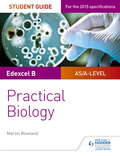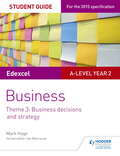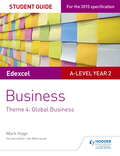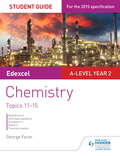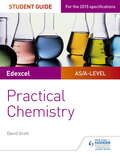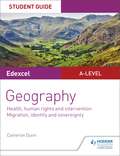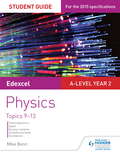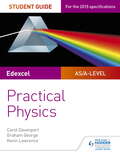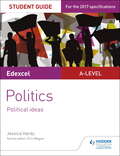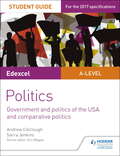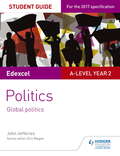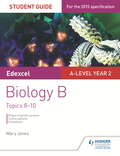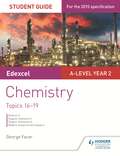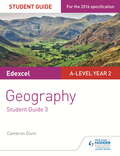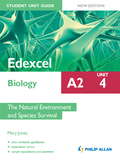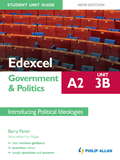- Table View
- List View
Edexcel A-level Biology Student Guide: Practical Biology
by Dan FoulderExam Board: EdexcelLevel: AS/A-levelSubject: BiologyFirst Teaching: September 2015First Exam: June 2016Ensure your students get to grips with the core practicals and develop the skills needed to succeed with an in-depth assessment-driven approach that builds and reinforces understanding; clear summaries of practical work with sample questions and answers help to improve exam technique in order to achieve higher grades.Written by experienced teacher Martin Rowland, this Student Guide for practical Biology:- Help students easily identify what they need to know with a concise summary of required practical work examined in the A-level specifications.- Consolidate understanding of practical work, methodology, mathematical and other skills out of the laboratory with exam tips and knowledge check questions, with answers in the back of the book.- Provide plenty of opportunities for students to improve exam technique with sample answers, examiners tips and exam-style questions. - Offer support beyond the Student books with coverage of methodologies and generic practical skills not focused on in the textbooks.
Edexcel A-level Business Student Guide: Business decisions and strategy
by Mark HageReinforce your understanding throughout the course. Clear topic summaries with sample questions and answers will help you improve your exam technique to achieve higher grades.Written by experienced teacher and examiner Mark Hage this Student Guide for Business:-Identifies the key content you need to know with a concise summary of topics examined in the A-level specifications-Enables you to measure your understanding with exam tips and knowledge check questions, with answers at the end of the guide-Helps you to improve your exam technique with sample answers to exam-style questions-Develops your independent learning skills with content you can use for further study and research
Edexcel A-level Business Student Guide: Global Business
by Mark HageReinforce your understanding throughout the course. Clear topic summaries with sample questions and answers will help you improve your exam technique to achieve higher grades.Written by experienced teacher and examiner Mark Hage this Student Guide for Business:-Identifies the key content you need to know with a concise summary of topics examined in the A-level specifications-Enables you to measure your understanding with exam tips and knowledge check questions, with answers at the end of the guide-Helps you to improve your exam technique with sample answers to exam-style questions-Develops your independent learning skills with content you can use for further study and research
Edexcel A-level Business Student Guide: Theme 3: Business decisions and strategy
by Mark HageExam Board: EdexcelLevel: AS/A-levelSubject: BusinessWritten by experienced author Mark Hage, this Student Guide for Business focuses on the key topics of business objectives and strategy, growth and managing change. The first section, Content Guidance, summarises content needed for the exams, with knowledge-check questions throughout. The second section, Questions and Answers, provides samples of different questions and student answers with examples of how many marks are available for each question. Students can:- Identify key content for the exams with our concise summary of topics- Find out what examiners are looking for with our Questions and Answers section- Test their knowledge with rapid-fire questions and answers - Avoid common pitfalls with clear definitions and exam tips throughout- Reinforce their learning with bullet-list summaries at the end of each section
Edexcel A-level Business Student Guide: Theme 4: Global Business
by Mark HageExam Board: EdexcelLevel: AS/A-levelSubject: BusinessWritten by experienced author Mark Hage, this Student Guide for Business focuses on the key topics of globalisation, global business and international trade. The first section, Content Guidance, summarises content needed for the exams, with knowledge-check questions throughout. The second section, Questions and Answers, provides samples of different questions and student answers with examples of how many marks are available for each question. Students can:- Identify key content for the exams with our concise summary of topics- Find out what examiners are looking for with our Questions and Answers section- Test their knowledge with rapid-fire questions and answers - Avoid common pitfalls with clear definitions and exam tips throughout- Reinforce their learning with bullet-list summaries at the end of each section
Edexcel A-level Chemistry Student Guide 3: Topics 11-15
by George FacerWritten by experienced examiner George Facer, this Student Guide for Chemistry:-Identifies the key content you need to know with a concise summary of topics examined in the A-level specifications-Enables you to measure your understanding with exam tips and knowledge check questions, with answers at the end of the guide-Helps you to improve your exam technique with sample answers to exam-style questions-Develops your independent learning skills with content you can use for further study and research
Edexcel A-level Chemistry Student Guide: Practical Chemistry
by David ScottExam Board: EdexcelLevel: A-levelSubject: ChemistryFirst Teaching: September 2015First Exam: September 2017Ensure your students get to grips with the core practicals and develop the skills needed to succeed with an in-depth assessment-driven approach that builds and reinforces understanding; clear summaries of practical work with sample questions and answers help to improve exam technique in order to achieve higher grades.Written by experienced teacher and author David Scott, this Student Guide for practical Chemistry:- Help students easily identify what they need to know with a concise summary of required practical work examined in the A-level specifications.- Consolidate understanding of practical work, methodology, mathematical and other skills out of the laboratory with exam tips and knowledge check questions, with answers in the back of the book.- Provide plenty of opportunities for students to improve exam technique with sample answers, examiners tips and exam-style questions. - Offer support beyond the Student books with coverage of methodologies and generic practical skills not focused on in the textbooks.
Edexcel A-level Chemistry Student Guide: Practical Chemistry
by David ScottExam Board: EdexcelLevel: A-levelSubject: ChemistryFirst Teaching: September 2015First Exam: June 2016Ensure your students get to grips with the core practicals and develop the skills needed to succeed with an in-depth assessment-driven approach that builds and reinforces understanding; clear summaries of practical work with sample questions and answers help to improve exam technique in order to achieve higher grades.Written by experienced teacher and author David Scott, this Student Guide for practical Chemistry:- Help students easily identify what they need to know with a concise summary of required practical work examined in the A-level specifications.- Consolidate understanding of practical work, methodology, mathematical and other skills out of the laboratory with exam tips and knowledge check questions, with answers in the back of the book.- Provide plenty of opportunities for students to improve exam technique with sample answers, examiners tips and exam-style questions. - Offer support beyond the Student books with coverage of methodologies and generic practical skills not focused on in the textbooks.
Edexcel A-level Geography Student Guide 5: Health Human Rights Epub
by Cameron DunnExam Board: EdexcelLevel: AS/A-levelSubject: GeographyFirst teaching: September 2016First exams: Summer 2017 (AS), Summer 2018 (A-level)Reinforce students' geographical understanding throughout their course; clear topic summaries with sample questions and answers help students improve their exam technique and achieve their best.Written by a teacher with extensive examining experience, this guide:- Helps students identify what they need to know with a concise summary of the topics examined at AS and A-level- Consolidates understanding through assessment tips and knowledge-check questions- Offers opportunities for students to improve their exam technique by consulting sample graded answers to exam-style questions- Develops independent learning and research skills- Provides the content students need to produce their own revision notes
Edexcel A-level Physics Student Guide 4: Topics 9-13
by Mike BennWritten by experienced author Mike Benn, this Student Guide for Physics:Written by experienced teacher Pauline Lowrie, this Student Guide for Biology:- Helps students identify what they need to know with a concise summary of the topics examined in the AS and A-level specifications- Consolidates understanding with tips and knowledge check questions- Provides opportunities to improve exam technique with sample answers to exam-style questions- Develops independent learning and research skills- Provides the content for generating individual revision notes
Edexcel A-level Physics Student Guide: Practical Physics
by Graham George Carol DavenportEnsure your students get to grips with the core practicals and develop the skills needed to succeed with an in-depth assessment-driven approach that builds and reinforces understanding; clear summaries of practical work with sample questions and answers help to improve exam technique in order to achieve higher grades.Written by experienced teachers Carol Davenport, Graham George and Kevin Lawrence, this Student Guide for practical Physics:- Help students easily identify what they need to know with a concise summary of required practical work examined in the A-level specifications.- Consolidate understanding of practical work, methodology, mathematical and other skills out of the laboratory with exam tips and knowledge check questions, with answers in the back of the book.- Provide plenty of opportunities for students to improve exam technique with sample answers, examiners tips and exam-style questions. - Offer support beyond the Student books with coverage of methodologies and generic practical skills not focused on in the textbooks
Edexcel A-level Physics Student Guide: Practical Physics
by Graham George Carol DavenportExam Board: EdexcelLevel: AS/A-levelSubject: PhysicsFirst Teaching: September 2015First Exam: June 2016Ensure your students get to grips with the core practicals and develop the skills needed to succeed with an in-depth assessment-driven approach that builds and reinforces understanding; clear summaries of practical work with sample questions and answers help to improve exam technique in order to achieve higher grades.Written by experienced teachers Carol Davenport, Graham George and Kevin Lawrence, this Student Guide for practical Physics:- Help students easily identify what they need to know with a concise summary of required practical work examined in the A-level specifications.- Consolidate understanding of practical work, methodology, mathematical and other skills out of the laboratory with exam tips and knowledge check questions, with answers in the back of the book.- Provide plenty of opportunities for students to improve exam technique with sample answers, examiners tips and exam-style questions. - Offer support beyond the Student books with coverage of methodologies and generic practical skills not focused on in the textbooks
Edexcel A-level Politics Student Guide 3: Political Ideas
by Jessica HardyWritten by experienced teacher Jessica Hardy this Student Guide for Politics:-Identifies the key content you need to know with a concise summary of topics examined in the AS/A-level specifications-Enables you to measure your understanding with exam tips and knowledge check questions, with answers at the end of the guide-Helps you to improve your exam technique with sample answers to exam-style questions-Develops your independent learning skills with content you can use for further study and research
Edexcel A-level Politics Student Guide 3: Political Ideas
by Jessica HardyWritten by experienced teacher Jessica Hardy this Student Guide for Politics:-Identifies the key content you need to know with a concise summary of topics examined in the AS/A-level specifications-Enables you to measure your understanding with exam tips and knowledge check questions, with answers at the end of the guide-Helps you to improve your exam technique with sample answers to exam-style questions-Develops your independent learning skills with content you can use for further study and research
Edexcel A-level Politics Student Guide 4: Government and Politics of the USA
by Andrew Colclough Sarra JenkinsWritten by experienced teachers Andrew Colclough and Sarra Jenkins this Student Guide for Politics:-Identifies the key content you need to know with a concise summary of topics examined in the A-level specifications-Enables you to measure your understanding with exam tips and knowledge check questions, with answers at the end of the guide-Helps you to improve your exam technique with sample answers to exam-style questions-Develops your independent learning skills with content you can use for further study and research
Edexcel A-level Politics Student Guide 4: Government and Politics of the USA
by Andrew Colclough Sarra JenkinsExam board: EdexcelLevel: A-levelSubject: PoliticsFirst teaching: September 2017First exams: Summer 2018 (AS) Summer 2019 (A-Level)Written by experienced teachers Andrew Colclough and Sarra Jenkins this Student Guide for Politics:-Identifies the key content you need to know with a concise summary of topics examined in the A-level specifications-Enables you to measure your understanding with exam tips and knowledge check questions, with answers at the end of the guide-Helps you to improve your exam technique with sample answers to exam-style questions-Develops your independent learning skills with content you can use for further study and research
Edexcel A-level Politics Student Guide 5: Global Politics
by John JefferiesWritten by experienced teacher John Jefferies this Student Guide for Politics:-Identifies the key content you need to know with a concise summary of topics examined in the A-level specifications-Enables you to measure your understanding with exam tips and knowledge check questions, with answers at the end of the guide-Helps you to improve your exam technique with sample answers to exam-style questions-Develops your independent learning skills with content you can use for further study and research
Edexcel A-level Politics Student Guide 5: Global Politics
by John JefferiesWritten by experienced teacher John Jefferies this Student Guide for Politics:-Identifies the key content you need to know with a concise summary of topics examined in the A-level specifications-Enables you to measure your understanding with exam tips and knowledge check questions, with answers at the end of the guide-Helps you to improve your exam technique with sample answers to exam-style questions-Develops your independent learning skills with content you can use for further study and research
Edexcel A-level Year 2 Biology B Student Guide: Topics 8-10
by Mary JonesExam Board: EdexcelLevel: A-levelSubject: BiologyFirst Teaching: September 2015First Exam: June 2017Written by experienced examiner Mary Jones, this Student Guide for Biology:-Identifies the key content you need to know with a concise summary of topics examined in the A-level specifications-Enables you to measure your understanding with exam tips and knowledge check questions, with answers at the end of the guide-Helps you to improve your exam technique with sample answers to exam-style questions-Develops your independent learning skills with content you can use for further study and research
Edexcel A-level Year 2 Biology B Student Guide: Topics 8-10
by Mary JonesExam Board: EdexcelLevel: A-levelSubject: BiologyFirst Teaching: September 2015First Exam: June 2017Written by experienced examiner Mary Jones, this Student Guide for Biology:-Identifies the key content you need to know with a concise summary of topics examined in the A-level specifications-Enables you to measure your understanding with exam tips and knowledge check questions, with answers at the end of the guide-Helps you to improve your exam technique with sample answers to exam-style questions-Develops your independent learning skills with content you can use for further study and research
Edexcel A-level Year 2 Chemistry Student Guide: Topics 16-19
by George FacerWritten by experienced examiner George Facer, this Student Guide for Chemistry:-Identifies the key content you need to know with a concise summary of topics examined in the A-level specifications-Enables you to measure your understanding with exam tips and knowledge check questions, with answers at the end of the guide-Helps you to improve your exam technique with sample answers to exam-style questions-Develops your independent learning skills with content you can use for further study and research
Edexcel A-level Year 2 Geography Student Guide 3: The Water Cycle and Water Insecurity; The Carbon Cycle and Energy Security; Superpowers
by Cameron Dunn Michael WitherickReinforce students' geographical understanding throughout their course; clear topic summaries with sample questions and answers help students improve their exam technique and achieve their best.Written by a teacher with extensive examining experience, this guide:- Helps students identify what they need to know with a concise summary of the topics examined at AS and A-level- Consolidates understanding through assessment tips and knowledge-check questions- Offers opportunities for students to improve their exam technique by consulting sample graded answers to exam-style questions- Develops independent learning and research skills- Provides the content students need to produce their own revision notes
Edexcel A-level Year 2 Geography Student Guide 3: The Water Cycle and Water Insecurity; The Carbon Cycle and Energy Security; Superpowers
by Cameron Dunn Michael WitherickExam board: EdexcelLevel: A-levelSubject: GeographyFirst teaching: September 2016First exams: Summer 2017Reinforce students' geographical understanding throughout their course; clear topic summaries with sample questions and answers help students improve their exam technique and achieve their best.Written by a teacher with extensive examining experience, this guide:- Helps students identify what they need to know with a concise summary of the topics examined at AS and A-level- Consolidates understanding through assessment tips and knowledge-check questions- Offers opportunities for students to improve their exam technique by consulting sample graded answers to exam-style questions- Develops independent learning and research skills- Provides the content students need to produce their own revision notes
Edexcel A2 Biology Student Unit Guide New Edition: Unit 4 The Natural Environment and Species Survival
by Mary JonesWritten by a senior examiner, Mary Jones, this Edexcel A2 Biology Student Unit Guide is the essential study companion for Unit 4: The Natural Environment and Species Survival.This full-colour book includes all you need to know to prepare for your unit exam: clear guidance on the content of the unit, with topic summaries, knowledge check questions and a quick-reference index examiner's advice throughout, so you will know what to expect in the exam and will be able to demonstrate the skills required exam-style questions, with graded student responses, so you can see clearly what is required to get a better grade
Edexcel A2 Government & Politics Student Unit Guide (New Edition): Unit 3B Introducing Political Ideologies
by Barry PavierWritten by a senior examiner, Barry Pavier, this Edexcel A2 Government & Politics Student Unit Guide is the essential study companion for Unit 3B: Introducing Political Ideologies; clear guidance on the content of the unit, with topic summaries, knowledge check questions and a quick-reference index examiner's advice throughout, so you will know what to expect in the exam and will be able to demonstrate the skills requiredexam-style questions, with graded student responses, so you can see clearly what is required to get a better grade.
